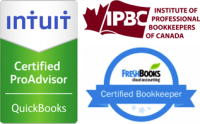
1. Ignoring CRA correspondence
Ignoring the brown envelopes from the CRA won’t make them disappear, and chances are that it might not be as bad as you think.
Having someone who is used to reading these letters can ease your mind by deciphering what needs to be done. From experience, being pro-active and keeping in contact will keep you out of trouble, even if you don’t have the money to pay right away.
2. Procrastinating with your bookkeeping
How good would you feel if your books were up to date and you knew how your business was doing on a regular basis?
Having your receipts pile up creates clutter in your office and your mind. The longer you wait, the less likely you are to remember specifics about your income and expenses. Get it done and save yourself headaches.
3. Not paying employer portion of payroll liabilities
Most new business owners don’t know that as an employer, you need to match CPP and EI that is withheld on the employee’s paycheques.
These amounts can add up quickly, and when your T4’s are filed, you will get a bill for the employer portion which could cripple your business. The payroll division of CRA tends to be the most severe and quickest to hand out penalties. Hand over your payroll to a professional.
4. Annual HST filers being surprised at how much they owe
Did you know that one year’s worth of HST could be $10,000 or more depending on your business?
Setting up an HST savings account is a great way to help you budget for the annual payment. If you work with a bookkeeper, they can tell you how much you would owe each month so that you will be prepared. Alternatively, switching to filing quarterly is another option. 5. Self employed person’s obligation to pay CPP Did you know that all self employed individuals are obligated to pay 9.9% CPP (Canada Pension Plan) on all net earnings over $3500? Many self employed people do not earn enough to pay income tax, however they still owe CPP at tax time, and are unable to pay on time. Avoid unpleasant surprises and plan ahead.
5. Self employed person’s obligation to pay CPP
Did you know that all self employed individuals are obligated to pay 9.9% CPP (Canada Pension Plan) on all net earnings over $3500?
Many self employed people do not earn enough to pay income tax, however they still owe CPP at tax time, and are unable to pay on time. Avoid unpleasant surprises and plan ahead.

